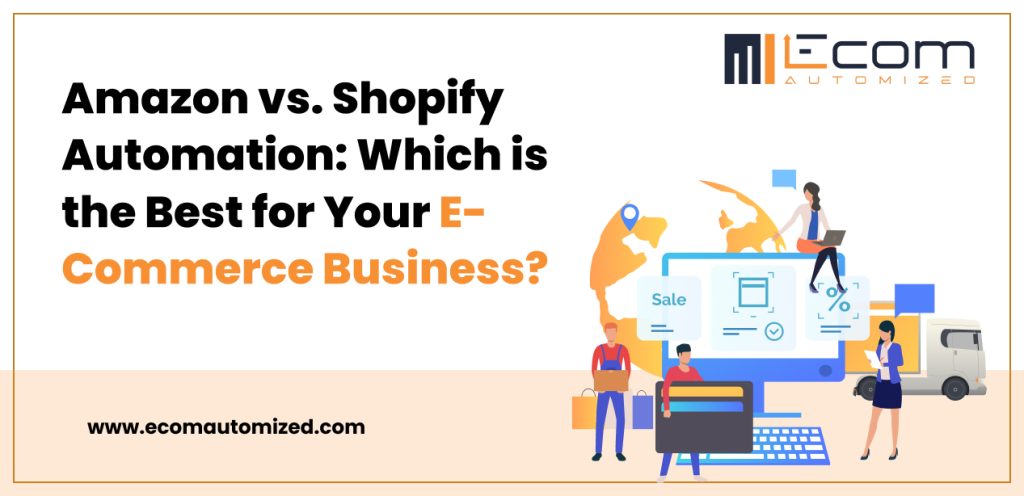Introduction:
In the fast-growing world of e-commerce, automation has become a game-changer for businesses looking to streamline operations, reduce manual work, and scale effortlessly. Two of the most popular platforms for e-commerce automation are Amazon and Shopify. While both offer unique advantages, choosing the right automation solution for your business depends on various factors such as business goals, budget, and operational preferences. Here we’ll compare Amazon and Shopify automation to help you determine which is best suited for your e-commerce business.
Understanding Amazon Automation
What is Amazon Automation?
Amazon automation refers to using tools, software, and services to streamline the processes involved in running an Amazon store. This includes product sourcing, listing, inventory management, order fulfillment, customer service, and pricing optimization. Many entrepreneurs opt for a hands-off approach by hiring Amazon automation services to manage their businesses on autopilot.
Benefits of Amazon Automation
- Scalability Automated processes allow businesses to scale rapidly without hiring a large team.
- Massive customer base to Amazon provides access to millions of buyers worldwide, increasing sales opportunities.
- FBA (Fulfillment by Amazon) support with FBA, Amazon handles warehousing, packaging, and shipping, reducing logistical challenges.
- Passive income opportunity with the right automation strategies, sellers can generate income without day-to-day involvement.
- Data-Driven decision-making Amazon provides analytics and reporting tools to optimize product performance and marketing.
Challenges of Amazon Automation
- Strict Policies and Regulations Amazon enforces strict selling policies, and failure to comply can lead to account suspension.
- High Competition due to its popularity, competition is fierce, requiring a well-thought-out strategy.
- Profit Margins for Amazon charges various fees, including referral and FBA fees, which can impact profitability.
- Limited Branding, unlike Shopify, Amazon sellers have limited control over branding and store customization.
Understanding Shopify Automation
What is Shopify Automation?
Shopify automation refers to the use of tools and services to manage and optimize a Shopify store efficiently. Shopify automation agencies help businesses streamline tasks such as product uploads, order processing, marketing, inventory management, and customer engagement.
Benefits of Shopify Automation
- Complete Control and Customization Shopify allows full control over store design, branding, and user experience.
- Higher Profit Margins without marketplace fees like Amazon, Shopify store owners can retain more profits.
- Flexible Business Models Businesses can engage in dropshipping, print-on-demand, or traditional inventory models.
- Integration with Multiple Tools Shopify integrates with a variety of automation tools, including marketing, CRM, and logistics.
- SEO and Marketing Control Sellers can run their own SEO and marketing campaigns to drive traffic and increase sales.
Challenges of Shopify Automation
- Traffic Generation Responsibility Unlike Amazon, Shopify does not provide built-in traffic, requiring store owners to invest in marketing.
- Website Maintenance Shopify stores need regular updates and optimization for smooth operation.
- Customer Service Management Unlike Amazon’s FBA, Shopify sellers must handle their own customer service and order fulfillment unless they use third-party services.
- Higher Upfront Costs Setting up a Shopify store and running ads require an initial investment.
Amazon vs. Shopify Automation: Which is Better?
Cost and Profitability
| Amazon | Higher fees, but access to an existing customer base. |
| Shopify | No marketplace fees, but requires marketing investment to attract customers. |
Business Control and Branding
| Amazon | Limited branding control, operates under Amazon’s rules. |
| Shopify | Full control over branding, store design, and marketing strategies. |
Ease of Scaling
| Amazon | Easier to scale due to FBA and high traffic. |
| Shopify | Requires paid marketing and optimization to scale effectively |
Risk and Restrictions
| Amazon | Strict policies, risk of account suspension. |
| Shopify | Fewer restrictions, but requires effort to build and maintain the store. |
Conclusion
The choice between Amazon automation and Shopify automation depends on your business goals.
- If you prefer a done-for-you, passive income model with built-in customer traffic, Amazon automation is a great option.
- If you want full control over your brand, higher profit margins, and long-term scalability, Shopify automation is the better choice.
For those looking for professional assistance, hiring a Shopify automation agency or an Amazon automation service provider can help streamline operations and ensure long-term success. Evaluate your business needs, budget, and long-term vision before making a decision. Both Amazon and Shopify automation have their advantages and drawbacks. Amazon offers a ready-to-go marketplace but comes with strict policies and competition, while Shopify provides autonomy but requires marketing effort. The best choice depends on your business needs, budget, and long-term goals. Entrepreneurs who value brand control and flexibility might prefer Shopify, whereas those who want quick scalability with a pre-existing audience may find Amazon automation more appealing. Would you rather have full control over your store or leverage a massive marketplace? Your answer will determine the best platform for your e-commerce automation journey.
Are you ready to automate your e-commerce business? Explore the best Amazon and Shopify automation services today!
